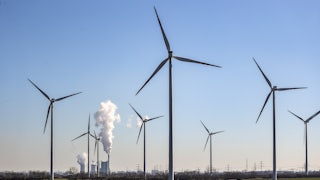After Iraq invaded Kuwait in 1990, Secretary of State James Baker made an explicit argument for why the United States had a vital interest in reversing the conquest, by force if necessary. “If you want to sum it up in one word, it’s jobs,” he said. “An economic recession worldwide, caused by the control by one nation—one dictator if you will—of the West’s economic lifeline, will result in the loss of jobs for American citizens.”
Policymakers are rarely so blunt about the role that oil plays in the country’s geopolitical decision-making. (Baker later lamented that his admission “got a lot of attention and flack.”) But the U.S. economy’s reliance on natural resources controlled by repressive regimes has been a problem for decades—and it continues to be. Even as Western countries imposed harsh sanctions on Russia for its invasion of Ukraine in February and early March, they continued to pay huge sums to Moscow for its oil and gas. On March 8, Joe Biden finally announced that the U.S. would ban Russian energy imports. The president prepared the public for what is to come. “Defending freedom is going to cost,” he said. That’s especially true because gas prices were already at record highs before his announcement. “I’m going to do everything I can to minimize Putin’s price hike here at home.”
“Everything” includes urging Saudi Arabia, the United Arab Emirates, and—more surprisingly—Venezuela to increase gas exports to lower prices in the U.S. During the 2020 presidential campaign, Biden said there was “very little social redeeming value in the present government in Saudi Arabia” and promised to “make them a pariah.” On March 7, press secretary Jan Psaki said he stood by those words. But reports have surfaced of White House officials planning a trip to Riyadh, which follows a visit there last month by members of the National Security Council and the State Department and a phone call between Biden and Saudi King Salman bin Abdulaziz Al Saud, in which the two discussed oil supplies. Last year, the administration hosted a senior Saudi figure in Washington and gave him the royal treatment.
So far, the Saudis have refused to budge, weighing their relationship with the U.S. against their friendship with Russia. The two countries together lead the world’s oil cartel, OPEC. And in late February, the United Arab Emirates abstained from a United Nations Security Council resolution that would have condemned Russia’s invasion of Ukraine. “What’s new is the shift in policy in the Gulf States being publicly willing not to support U.S. policy,” says Annelle Sheline, a fellow with the Baker Institute Center for the Middle East at Rice University. Reports even surfaced this week of Saudi and UAE leaders refusing to take Biden’s phone calls, although administration officials have said the incident was mischaracterized in the press. Still, “it’s pretty unprecedented,” said Sheline.
The sources of the Gulf states’ anger are not hard to discern. They date to the Obama administration, when the president was public about his dislike of Saudi Arabia and, worst of all from their perspective, signed a deal with Iran in 2015 that lifted some sanctions in exchange for capping Iran’s nuclear capabilities. President Trump had a cozier relationship with the Gulf states, but he also threatened to withdraw troops from Saudi Arabia at one point. “This [tension] is not specific to Biden,” said Sheline. Iran is the mortal enemy of the Gulf states, which blame the U.S. for the Iranians’ increasing power in the region. “Iran has been able to extend its influence throughout the broken polities of the eastern Arab world despite the relative weakness of its conventional military forces,” wrote the political scientist F. Gregory Gause III, in Foreign Affairs.
Biden has had more success in his outreach in South America. On March 5, high-level U.S. officials visited Venezuela for the first time since the two countries broke off relations in 2019. Soon after the meeting, Venezuela released two U.S. prisoners from its jails. “It’s entirely motivated by the Russia crisis and the spike in oil prices,” said Francisco Rodriguez, a Venezuela expert at the Council on Foreign Relations. However, the outreach is also a consequence of the evident failure of years of U.S. policy. Barack Obama slapped Venezuela with sanctions as it descended into tyranny. After Nicolás Maduro rigged the 2018 presidential election to win another term, the U.S. refused to recognize the results and broke off relations completely. But there has been no change in Venezuelan behavior. “If anything, it’s made them more authoritarian,” said Rodriguez. The drop-off in Russian oil supplies offers the Biden administration an opportunity to reverse a failed policy and engage with Maduro’s regime in a new, more realistic way.
But Biden will face domestic opposition, just as Obama did when he tried to engage with Cuba and Iran. Florida Republican Senator Marco Rubio accused Biden of “want[ing] to replace the oil we buy from one murderous dictator with oil from another murderous dictator.” But Maduro has withstood sanctions for years without changing his behavior, so it seems perverse to continue a failed policy. Isolated regimes such as Cuba and Iran have shown that they can survive for decades even when Western countries inflict economic punishment on them.
That reality hasn’t changed Washington’s self-defeating obstinacy in dealing with Iran. It was just announced that Iran and Western countries suspended their talks over Iran’s nuclear program—this after many reports indicated that they had been close to a deal. “Undoubtedly the war in Ukraine has made it more difficult to get an agreement,” the Irish diplomat who facilitated the talks told reporters. The suspension in talks nixes any possibility of Iran supplying some of the oil Western countries need in the near future.
Biden’s difficulties aside, all the diplomatic maneuvering necessitated by oil spikes shows the long-standing, ongoing absurdity of the Western world relying on fossil fuels provided by other countries to fund its energy needs. “This should be treated as an opportunity, the United States needs to update its approach and be investing in renewable energies, which don’t experience this kind of volatility,” said Sheline. If Biden succeeds in finding other countries to pump more oil, it would solve his short-term political problems and ease the price hikes at the pumps. But it only compounds the larger problem of our dependency on climate-destroying fossil fuels. Switching to renewable resources offers the U.S. more strategic options that don’t depend on the goodwill of dictatorships and other unsavory regimes, and also increases the chances that the entire earth won’t become an overheated disaster zone.
That wouldn’t be easy, because it would involve shifting much of the economy onto an entirely different footing. But it could be done, with willpower, leadership, and Americans’ understanding of what such a move entails. As Biden said when announcing his sanctions on oil supplies, “There will be costs here in the United States.”






